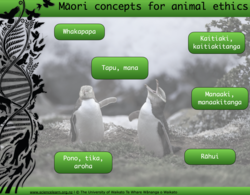
Pono, tika and aroha are central values or ethical concepts of te ao Māori that provide guidance for right action and leadership. Pono is concerned with knowledge of reality, tika is concerned with the right response to reality and aroha is concerned with a loving response to reality.
Although each word can stand alone, when considered together, they encompass a sense of doing the right thing with integrity and love.
All our practitioners show aroha for the animals they told us about. Aroha can include interest, devotion to study and economic decisions.
For example, Te Winiwini Kingi made efforts to conserve the remnants of original bush in the gullies on his land, refusing to earn money by grazing cows, knowing how this would damage what was left of the natural forest ecology.
Based on holistic and relational concepts, Māori ethics are less likely to fall prey to anthropocentrism whereby only humans have rights that are not extended to non-human animals.
Taken together, pono, tika and aroha entail respect and a sense of responsibility for truth and the natural world of which both animals and humans are part.
These key Māori concepts also give rise to more elaborated concepts, such as whanaungatanga, which refers to the recognition of relationships based on whakapapa, and rangatiratanga, which refers to qualities of leadership and autonomy based on upholding cultural values.
Two more such concepts, kaitiakitanga and manaakitanga, feature prominently in discussions about incorporating Māori knowledge in environmental research and education.
Image: A young fern frond. Museum of New Zealand Te Papa Tongarewa


